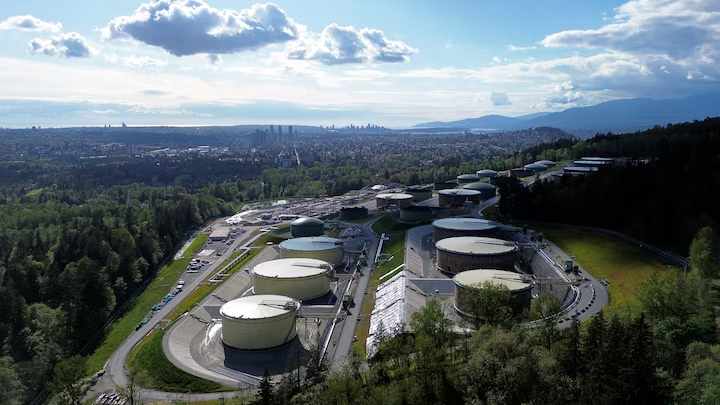China has emerged as the leading buyer of Canadian crude oil transported through the newly expanded Trans Mountain (TMX) pipeline, marking a major shift in North American energy trade. The development comes amid a growing trade rift between Canada and the United States and reflects China’s strategic push to diversify its energy sources.
The TMX pipeline, which tripled its capacity to 890,000 barrels per day (bpd) after completing a $24.84 billion (C$34 billion) expansion last year, has dramatically altered global crude trade routes. In just one year, Canada’s oil exports to China via TMX averaged 207,000 bpd, up from just 7,000 bpd in 2014, according to data from Kpler and the Canada Energy Regulator. This dramatic growth has pushed China past the U.S. to become the top recipient of TMX-exported crude.
This shift in trade patterns is largely driven by escalating geopolitical tensions. Following the imposition of a 10% U.S. tariff on Canadian energy products last year, Canadian producers have increasingly turned toward Asian markets. Simultaneously, China, constrained by Western sanctions on Russian and Venezuelan oil, has sought alternative suppliers. These converging pressures have made Canadian heavy crude an attractive option for Chinese refiners.
One of the key players in this evolving relationship is Rongsheng Petrochemical, a major Chinese private-sector refiner. The company recently established a Calgary office to facilitate purchases and has secured crude supply agreements with Canadian oil major Suncor Energy. Alongside state-run Sinopec, Rongsheng is among the Chinese companies capitalizing on the affordability and reliability of Canada’s Access Western Blend (AWB), a heavy crude well-suited to Chinese refining needs.
This trend represents a notable strategic gain for Canada, which has long been criticized for its overreliance on the U.S. as its primary energy export market. Until recently, Canadian oil was largely landlocked, with the U.S. Gulf Coast acting as the primary refining hub. The TMX expansion, which connects Alberta’s oil sands to the Pacific port of Burnaby, British Columbia, now offers Canadian producers direct access to global markets.
Beyond China, other Asian countries are also increasing their intake of Canadian crude. Shipments to India, South Korea, and Japan have also seen a sharp rise, further diversifying Canada’s oil export destinations. Industry analysts see this as a long-awaited breakthrough for Canada’s energy sector.
In 2024, the TMX pipeline operated at approximately 77% capacity, indicating room for further growth. Industry experts suggest that Canada may soon consider a second phase of expansion, potentially boosting capacity by another 200,000 to 300,000 bpd. However, political, environmental, and regulatory hurdles remain significant challenges to the development of additional coastal export infrastructure.
While U.S. refiners still import considerable volumes of Canadian crude, especially for Gulf Coast processing, the new trend indicates a weakening grip. Canadian officials, responding to American protectionism, have expressed support for market diversification and closer ties with Asia.
The implications are far-reaching. China’s emergence as Canada’s top crude customer signals a growing energy partnership and may influence future Canadian foreign policy decisions. At the same time, it raises concerns in Washington over reduced Canadian alignment with U.S. energy interests.
The success of the TMX project is a rare victory for Canada’s energy sector, which has faced years of delays, protests, and cost overruns. For Canadian producers, the ability to tap into high-growth Asian markets marks a turning point, providing new revenue streams and reducing dependency on volatile U.S. trade relations.
With demand from China expected to grow and TMX firmly in operation, the pipeline is now a crucial artery for Canada’s economic and geopolitical aspirations. Whether Canada can continue to build on this momentum will depend on its ability to navigate regulatory, environmental, and global market complexities.
Source; Reuters



